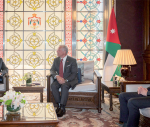You are here
Political scenes in turmoil
Aug 23,2015 - Last updated at Aug 23,2015
Israeli Prime Minister Benjamin Netanyahu’s government has been suffering from a diplomatic crisis. Israel stood against the international community, blocking any attempt to revive the peace talks with the Palestinians and repeatedly attempted to wreck the deal with Iran on its nuclear programme.
The Israeli failure to cope with the recent political developments in the region might be the reason for some of its irresponsible actions, such as opening a war front on the Golan Heights or even in the south of Lebanon. This might be Netanyahu’s only way to escape the political pressure, especially since the UN seems to be serious about reviving the peace talks between Israelis and Palestinians.
On the other side, the Palestinian scene does not seem to be in better shape.
The Palestinian leadership is facing many problems, not only with Israel but also within its ranks.
Intra-Palestinian squabbles are no longer along the Fateh-Hamas divide, but also within the Fateh movement itself.
There is tension between Mohammad Dahlan, former Fateh security chief, and Palestinian President Mahmoud Abbas, and a conflict between former prime minister Salam Fayyad and yet another senior Fateh leader, Yasser Abed Rabbo.
Meanwhile, Abed Rabbo, Dahlan and Fayyad were accused of having met in secret with US Secretary of State John Kerry in the UAE.
Many believed that Abbas was the ideal partner for the Americans to sign the peace plan known as Kerry’s Plan, even though his official term expired in 2010 and he is seen by some as illegitimate.
Despite this, many Western and Arab officials believe that Abbas is Netanyahu’s preferred partner, as he never misses a chance to back him up. Yet, things may be changing soon for Abbas, due to his many political failures, most important the failure to gain the minimum nine votes at the UN Security Council in his statehood bid.
According to some analysts, Abbas’ expressing the wish to quit, not officially, is seen as a tactical step aimed at drawing some attention after being badly marginalised by Arab and international leaders.
Moreover, there are numerous pressing challenges on the Palestinian scene: rebuilding Gaza, repositioning itself in a new regional system, addressing the security situation in Palestine, economic challenges and facilitating the economic development process.
According to Western sources, the new rivals to Abbas are Fayyad, accepted by the Americans as a moderate, Dahlan, who is looked upon as a security man, and Abed Rabbo. The three are being thought of as a guarantee to a safe and secure transition for Israel.
Those same sources also suggested that these leaders have the backing of the UAE and Egypt.
Palestinian politics, much like that in the rest of the region, are currently fluid and shifting.
The coming months may bring many new developments and potentially new faces.
Abbas himself is trying to promote some successors, such as the current secret services director, Majed Faraj, or even chief Palestinian negotiator Saeb Erekat.
The diplomatic crisis that faces Netanyahu today will certainly have an impact on the Palestinian scene. If changes in the Israeli political scene are highly needed to achieve some progress in the peace process, an upcoming change seems to be obligatory as well on the Palestinian scene.











